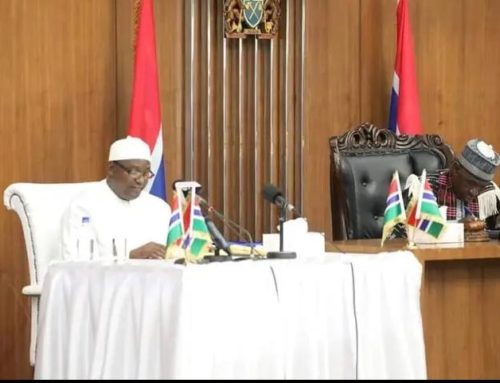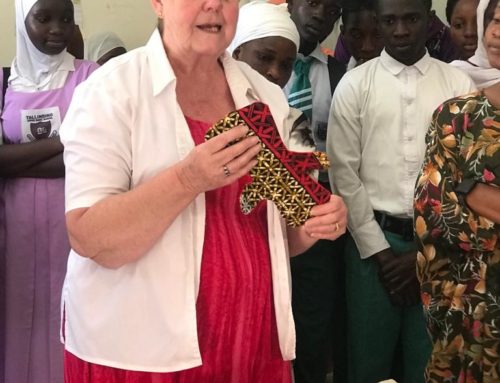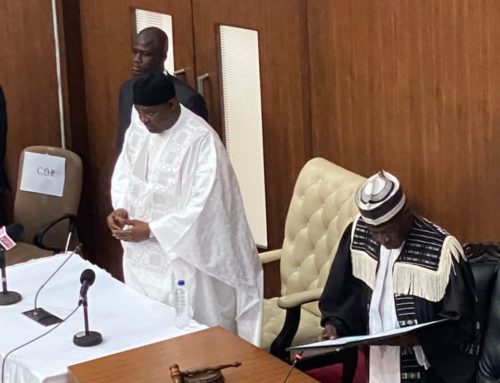KEY NOTE ADDESSS OF HIS EXCELLENCY ADAMA BARROW PRESIDENT OF THE REPUBLIC OF THE GAMBIA ON THE MEETING OF MINISTERS RESPONSIBLE FOR CHILD PROTECTION IN ECOWAS MEMBER STATES COVERED BY THE PROJECT TO SUPPORT CHILDREN VICTIMS OF HUMAN RIGHTS VIOLATIONS On 26TH MAY 2022, BANJUL
[Photo]
His Excellency Adama Barrow President of The Republic Of The Gambia
– Mrs. Fatou Kinteh, Honourable Minister of Gender, Children and Social Welfare and Chairperson of the occasion
– Dr.SigaFatmaJagne, Commissioner for Social Affairs and Gender, ECOWAS Commission
– Mr. Andrea,Regional, Representative of The UN OHCHR West and Central Africa
– Mr. Marco Falcone, Director of the Italian Agency Cooperation for Development
– UNICEF Representative and other UN Agencies here present
– PAPEV Project coordinator, The Gambia
– Development partners here present
– Representatives of Government Agencies here present
– Permanent Secretary and Senior staff from the Ministry of Gender, Children and Social Welfare
– Ministers responsible for child protection from the Sub-Region
– Civil society groups here present
– Media fraternity
– Ladies and Gentlemen
– All protocols duly and respectfully observed
I am deeply honoured and humbled to be part of this sub-regional but also very important event. We are gathered here today to share experiences on cross border cooperation on child protection in order to map out strategies to support advocacy among decision makers that will promulgate reforms to integrate children’s rights into policies. Additionally, this meeting will essentially enhance the adaptation process of the declaration on legal reforms and formulation of laws to facilitate the integration of child rights into policy formulation.
Madam Chairperson, distinguished guests, ladies and gentlemen, the ratification of the United Nations Convention on the Rights of the Child (UNCRC), by the government of The Gambia in 2005 generates a threefold obligation: the obligation to respect, to protect and to fulfil the rights recognized therein. The contextualization of this principle implies that the government of The Gambia recognises its legal obligation to establish a national child protection system, by adopting an integrated set of services, legislation and,creating institutions to promote and protect the rights of children at the national, regional and local level. More specifically, the government of the Gambia has over the years taken the necessary measures to prevent and respond to violence, exploitation, neglect and abuse against children. This also implies the provision of recovery and rehabilitation services to children who have been victims of neglect, abuse, violence and exploitation.
In fulfilling this legal commitment, tackling child protection issues and, vulnerabilities/risks affecting children, The Gambia has adopted various institutional and legal measures and programmes aiming at strengthening the National Child Protection System. In the near future, the government is planning to create a new national child protection strategy that will identify and respond to new child protection priority issues such as (the) strategy will be anchored on updated data and evidence-based information that will guide government programming and child protection interventions for the next cycle.
As a commitment to promoting, fulfilling the rights of all children, the government has established two legal entities responsible for all matters, regarding the protection of children. This includes a Ministry in charge of Gender, Children and Social Welfare (MoGCSW) and a Directorate of Children’s Affairs (DCA). As the main institution in charge of Children, the MoGCSW was created “to address the gaps in coverage and to align programmes more effectively in order to meet the varied needs of the population, to provide guidance to increase coordination of interventions, through the adoption of a systematic and harmonized mechanism of actualizing Gambia’s development goals. This Ministry is therefore mandated to deal with challenges related to influencing other Ministries on children and gender issues,
Madam Chairperson, the United Nations Convention on the Rights of the Child (UNCRC) (article 19) affirms the right for the child to be protected from all forms of physical or mental violence, injury or abuse, neglect or negligent treatment, maltreatment or exploitation, including sexual abuse, while in the care of parent(s), legal guardian(s), or any other person who has the care of the child. Since 2018, various new situations have occurred at the national level which will be reflected in the upcoming national child protection strategy. One of these has been the COVID-19 pandemic which has affected vulnerable populations worldwide, including children. To serve this purpose, the Ministry of Gender, Children and Social Welfare (MoGCSW) has initiated a new situation analysis to generate and collect evidence-based information that will feed into national planning processes and, therefore, guide the development of upcoming child protection interventions.
Madam Chairperson, Female Genital Mutilation (FGM/C), also known as female circumcision is a cultural practice deeply rooted in the beliefs and perceptions of Gambians. Due to the long-standing advocacy and awareness campaigns organized countrywide by government institutions, NGOs/CSOs and grassroots organizations, female circumcision which is widely known as a violation of the right to girls and women, was expressly criminalised by the Women’s Amendment Act 2015.
This implies that FGM/C is punishable by law and perpetrators liable to prison.
Similarly, child marriage is prohibited since 2016. This long-standing cultural practice was banned through an amendment of Section 2 and Section 24 of The Children’s Act, which set the legal age for marriage at 18 years. In the recent amendment of Section 2 of the Children’s Act, child marriage is defined as a “marriage contracted between a child and an adult or between a child and another child”. This amendment states that “a child shall not be capable of contracting a valid marriage and, child marriage is prohibited.
The young age of the Gambian population is a potential, because children are major actors in a country’s future and development. Therefore, they are an immense potential for an added value and benefit for their communities at the social, political and economic levels. The Gambia Government will continue to invest in them, so that they are provided with the opportunity to realize their full potential and enjoy their rights to survival, education, participation, development and, are mature enough to play their role in society and contribute greatly to its future and development.
Madam Chairperson, My Government continues to recognise its legal obligation to ensure that children are protected at all times, especially during emergencies. In view of this my government has worked on a planning and adoption of an emergency preparedness strategy, including (a) mechanism to enable the provision of an effective and timely emergency response to natural disasters or humanitarian crises. In this context, we will establish a Child Protection emergency Strategy that will provide measures to prevent and respond to abuse, neglect, exploitation and violence against children in the aftermath of a disaster or pandemic. This should include as a first step, guaranteeing that children receive all the necessary humanitarian assistance that is required for their safety and wellbeing. Indeed, the strategy prioritizes the fulfilment of certain rights for children in emergencies, especially those that protect children against maltreatment and ensures their survival and wellbeing. This responsibility falls on central and decentralized (regional, district and local) authorities, who are responsible for ensuring that services and assistance are available to children during such emergency situations.
Each year, many children in subregion are separated from their families because of poverty, abuse and neglect, migration, conflict and disasters. Many of them end up in the streets, in detention, living with employers, or in alternative care, including institutional care. Around the world, UN agencies, NGOs and governments,all strive to reintegrate children back into their families and communities so that they can grow up in a safe and caring environment. In order to ensure that reintegration is successful and permanent, it needs to be carried out through a sound process, ensuring that the children are ready to be reunited with their families, that the families are prepared to welcome them and, that there is good follow-up support after the reunification process.It is gratifying to note that the Ministry of Gender, Children and Social Welfare, through the (PAPEV) project and,together with other development partners, facilitated the reintegration of 159 children from Senegal and, united them with their families during the peak period of the COVID-19 Pandemic.
The National child protection strategy (2016-2020) was established after the assessment of the child protection system (2013), which pointed out a range of child protection issues and highlighted the need to strengthen the child protection system. The strategy was established on child rights and system approaches, which imply “moving away from fragmented, single-issue responses”, towards more comprehensive and sustainable interventions, ensuring that quality child protection services are available to all who need them. The system approach also aimed at “addressing factors, such as inadequate legal and policy frameworks, low levels of capacity among actors and, a lack of coordination among them, as well as, a lack of child protection data for programming, advocacy, resource mobilization, and tackling social norms, practices, and beliefs that are not protected and may be harmful to children.
These approaches were materialized through 6 strategic objectives, focusing on key elements of a child protection system and, bottlenecks hampering the right to protection of children.
The PAPEV Project also supported the review and update of the minimum standards guidelines for care institutions.In 2020, the Ministry of Gender, Children and Social Welfare engaged child protection stakeholders to review the Minimum Standards, specifically to identify challenges with implementation and compliance. Based on the recommendations, Standards on admission of children into Residential Homes for Children and reintegration of children with their families have been strengthened. Provisions have also been made on the use of volunteers in Residential Care Centres as a safeguard against orphanage “volunteerism” which has been shown to not only negatively impact children’s well-being, but also actively encouraging the proliferation of residential homes.
The placement of children in care institutions raises questions related to the quality and standards of services provided to them in residential institutions for disabled or vulnerable children. In The Gambia, care institutions are governed by the child safeguarding protocols in care institutions whose review and updating was supported by the PAPEV project in 2021. These protocols determine minimum standards concerning the qualification of personnel, the infrastructures and the quality of services provided to children.
Article 32.1 of the UNCRC establishes States’ legal responsibility to prevent children’s engagement in any economic exploitative work that is likely to be hazardous, or to interfere with the child’s education, or to be harmful to the child’s health or physical, mental, spiritual, moral or social development. This legal framework was contextualized in The Gambia by the Children’s Act, which equally prohibits exploitative, hazardous and night work (section 42) involving children.
Madam Chairperson, Ladies and gentlemen;
At the national level, there is an overall decrease in the prevalence of children aged 5 to 17 years who are involved in economic activities, household chores and hazardous work (MICS 2018). This trend was observed since 2010, with a noticeable reduction from 39.3% [in 2010] to 24.7% in 2018. This decrease was acknowledged by the United States Department of Labour (DOL), whichfound that The Gambia made advancements in combating child labour.
Madam Chairperson, distinguish guests, ladies and gentlemen, I will conclude by calling on participating countries to continue to work together with a common objective. Our network should aim to become a regional model of cooperation on issues of trans-national protection of children and youths.
I THANK YOU FOR YOUR KIND ATTENTION
End!





Leave A Comment